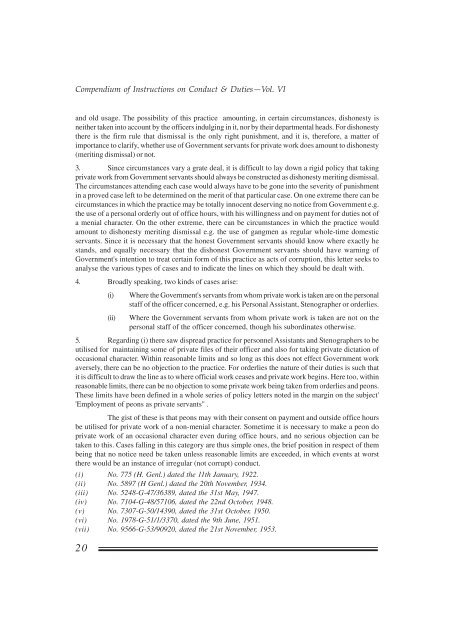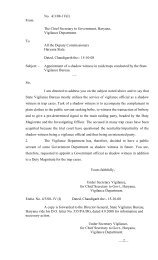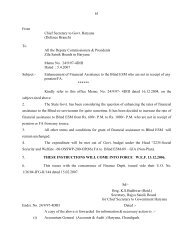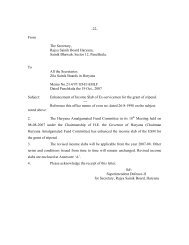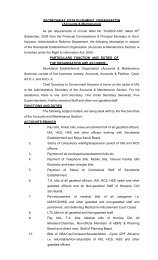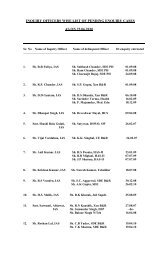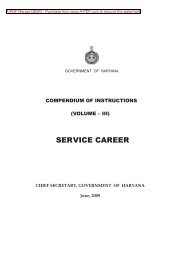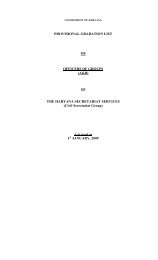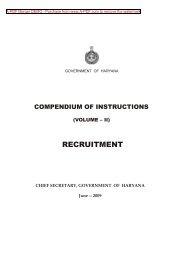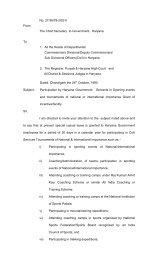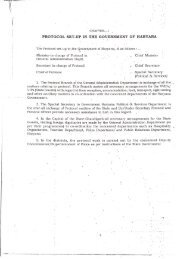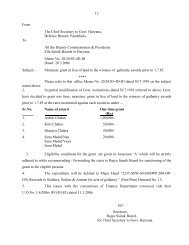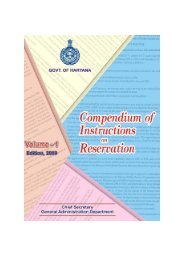compendium of instructions conduct & duties - Chief Secretary ...
compendium of instructions conduct & duties - Chief Secretary ...
compendium of instructions conduct & duties - Chief Secretary ...
- No tags were found...
You also want an ePaper? Increase the reach of your titles
YUMPU automatically turns print PDFs into web optimized ePapers that Google loves.
Compendium <strong>of</strong> Instructions on Conduct & Duties—Vol. VIand old usage. The possibility <strong>of</strong> this practice amounting, in certain circumstances, dishonesty isneither taken into account by the <strong>of</strong>ficers indulging in it, nor by their departmental heads. For dishonestythere is the firm rule that dismissal is the only right punishment, and it is, therefore, a matter <strong>of</strong>importance to clarify, whether use <strong>of</strong> Government servants for private work does amount to dishonesty(meriting dismissal) or not.3. Since circumstances vary a grate deal, it is difficult to lay down a rigid policy that takingprivate work from Government servants should always be constructed as dishonesty meriting dismissal.The circumstances attending each case would always have to be gone into the severity <strong>of</strong> punishmentin a proved case left to be determined on the merit <strong>of</strong> that particular case. On one extreme there can becircumstances in which the practice may be totally innocent deserving no notice from Government e.g.the use <strong>of</strong> a personal orderly out <strong>of</strong> <strong>of</strong>fice hours, with his willingness and on payment for <strong>duties</strong> not <strong>of</strong>a menial character. On the other extreme, there can be circumstances in which the practice wouldamount to dishonesty meriting dismissal e.g. the use <strong>of</strong> gangmen as regular whole-time domesticservants. Since it is necessary that the honest Government servants should know where exactly hestands, and equally necessary that the dishonest Government servants should have warning <strong>of</strong>Government's intention to treat certain form <strong>of</strong> this practice as acts <strong>of</strong> corruption, this letter seeks toanalyse the various types <strong>of</strong> cases and to indicate the lines on which they should be dealt with.4. Broadly speaking, two kinds <strong>of</strong> cases arise:(i)(ii)Where the Government's servants from whom private work is taken are on the personalstaff <strong>of</strong> the <strong>of</strong>ficer concerned, e.g. his Personal Assistant, Stenographer or orderlies.Where the Government servants from whom private work is taken are not on thepersonal staff <strong>of</strong> the <strong>of</strong>ficer concerned, though his subordinates otherwise.5. Regarding (i) there saw dispread practice for personnel Assistants and Stenographers to beutilised for maintaining some <strong>of</strong> private files <strong>of</strong> their <strong>of</strong>ficer and also for taking private dictation <strong>of</strong>occasional character. Within reasonable limits and so long as this does not effect Government workaversely, there can be no objection to the practice. For orderlies the nature <strong>of</strong> their <strong>duties</strong> is such thatit is difficult to draw the line as to where <strong>of</strong>ficial work ceases and private work begins. Here too, withinreasonable limits, there can be no objection to some private work being taken from orderlies and peons.These limits have been defined in a whole series <strong>of</strong> policy letters noted in the margin on the subject''Employment <strong>of</strong> peons as private servants" .The gist <strong>of</strong> these is that peons may with their consent on payment and outside <strong>of</strong>fice hoursbe utilised for private work <strong>of</strong> a non-menial character. Sometime it is necessary to make a peon doprivate work <strong>of</strong> an occasional character even during <strong>of</strong>fice hours, and no serious objection can betaken to this. Cases falling in this category are thus simple ones, the brief position in respect <strong>of</strong> thembeing that no notice need be taken unless reasonable limits are exceeded, in which events at worstthere would be an instance <strong>of</strong> irregular (not corrupt) <strong>conduct</strong>.(i) No. 775 (H. Genl.) dated the 11th January, 1922.(ii) No. 5897 (H Genl.) dated the 20th November, 1934.(iii) No. 5248-G-47/36389, dated the 31st May, 1947.(iv) No. 7104-G-48/57106, dated the 22nd October, 1948.(v) No. 7307-G-50/14390, dated the 31st October, 1950.(vi) No. 1978-G-51/1/3370, dated the 9th June, 1951.(vii) No. 9566-G-53/90920, dated the 21st November, 1953.20


